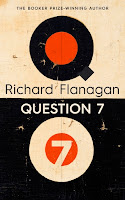This new book is non-fiction but revisits the real events behind these two novels, connecting them to - among other things - the history of Flanagan's native Tasmania, the invention of the nuclear bomb and the love life of HG Wells and Rebecca West. It's about the way reality informs fiction and fiction informs reality, and the way the past is present in the now. It's a remarkable, rich and vivid flit through all sorts of bits of history, at once directly, movingly personal and yet about us all.
Flanagan cites in his acknowledgements one key influence: the essay ‘The past is in the present is in the future’ by 18 year-old Sienna Stubbs, which describes her Yolŋu culture's understanding of a fourth tense, beyond past, present and future, in which what was and is and will be are all happening at once. So, all these years later after the real event, Flanagan is still 21 and trapped in his kayak, facing imminent death. And HG is still snogging the teenage Rebecca West. And the bomb is still being dropped on Horoshima.
Some of the history here I've already dug into, having made a Radio 4 documentary about how HG Well's novel The World Set Free, in which he coined the term "atomic bomb", inspired Hungarian physicist Leo Szilard to conceive the chain reaction component that would make such a thing a reality; but the Wells book also made him realise the terrible consequence of such a device used on an urban population. We seem to have worked from several of the same sources, and I'm glad to see that Flanagan, likewise, sees Szilard as both a pivotal and fascinating figure (whereas he makes a single, fleeting appearance in the film Oppenheimer).
Flanagan delves further than we did in our documentary (where we had just 42 minutes, and covered some other ground) to explore the circumstances in which Wells wrote The Wells Set Free and the women he was involved with at the time, as well as pursuing what happened to Szilard and addressing his own efforts to write science-fiction. I've got a copy of Szilard's book on its way and will report back in due course.
So it's a fascinating story being covered here, and yet also beautifully, succinctly told in short bursts that make it difficult to put down when you could just do one more short section. Yet it's also often viscerally shocking, whether detailing the impact of the bomb on Hiroshima or the genocide in Tasmania, or the denouement in which he recounts in detail his experience on the river. Also shocking is his meeting the men who held his father captor, asking one old man to hit slap him in the way he'd slapped the prisoners in his charge. Or there's the racism, sexism and cultural condescension faced while a student at Oxford (p. 231), and then this:
"Meanwhile, the Bullers wandered the Oxford streets, dressed absurdly as themselves or offensively as Nazis and after dinner had the whores in. The Buller B—who would be prime minister wanted me to be his wingman when he ran a second time for Oxford Union president, one more whore. I told him I couldn't stand the Union, that I wasn't a member, and why, in any case, would I bother? B— said when I ran he would help me if I helped him and so I repeated my original answer and B— fif-faf-fuddled because he really had no answer, no one did, he was charming and you couldn't believe a thing he said..." (pp. 233-4)









No comments:
Post a Comment